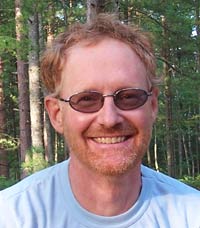Mathematical ecologist wins prestigious award
University of Wisconsin–Madison ecologist Anthony Ives is being recognized with the prestigious Robert H. MacArthur Award from the Ecological Society of America (ESA).

Ives
Awarded biennially, the MacArthur Award goes to an established mid-career ecologist who has made meritorious contributions to ecology and who is expected to continue to produce outstanding research. Ives will receive the award during ESA’s 2012 annual meeting, held August 5-10 in Portland, Ore.
A professor in the UW–Madison zoology department since 1990, Ives works at the interface of theoretical and experimental ecological questions, with a general focus on community ecology and population biology. He applies his expertise to a wide range of questions, from boom-bust cycles of midge populations at an Icelandic lake to predator-prey dynamics in the agricultural fields of Wisconsin.
“Ecological data are often very difficult to come by, so sometimes you have to be creative and a little bit unorthodox about how you work, which is great for me,” says Ives. “I love a data set that just doesn’t seem to make sense — those are my favorite projects, when it’s a puzzle.”
He was pulled toward a career in theoretical ecology from early on, when he knew that he liked both science and math, but didn’t want to spend all his time working inside a lab. He calls himself an “automobile mechanic type of scientist” and delights in problems without obvious solutions where he can play with data and statistics to find an approach and, usually, an answer.
One of Ives’ particular strengths is his ability to look at nature and describe it with equations, which affords him a unique lens on a variety of ecological questions, says longtime collaborator Claudio Gratton, a UW–Madison entomologist. “His work spans everything. He has been able to contribute to so many disciplines,” Gratton says.
“Ives is the rare scientist who can both formulate original theories and conduct experiments in the field and lab, whose research contributes to basic ecology and to contemporary public policy issues and who has mastered the art of synthesis and review as well as sophisticated statistical approaches,” says his award citation from the ESA.
With Ives’ honor, three of the just 16 MacArthur awardees hail from campus; fellow zoology professors Monica Turner and Stephen Carpenter won in 2008 and 2000, respectively. “UW-Madison has a long history of excellence in ecology,” says Jeff Hardin, zoology department chair. “This certainly speaks to the strength of our department.”
Though the MacArthur is an individual award, Ives credits much of his success to the importance and value of his collaborations throughout his career with researchers and students from UW–Madison and around the world.
“I don’t view my career as an individual achievement at all. I’ve had great students and postdocs and collaborators, so I view this as more of a community award which my name happens to be attached to,” he says.
But Gratton attributes the range and depth of those collaborations to Ives’ impressive drive, mental agility and creativity. “He always has the craziest and most wonderful ideas,” he says. And importantly, he adds, Ives is always willing to be wrong — though usually isn’t.
Often the most unexpected things turn out to be the most interesting, Ives says, and he’s always delving into new fields and looking for new ways to apply his skills.
“I had an epiphany a bit ago when I realized I had spent my entire career trying to be incompetent,” he says with a smile.
But as his success has made clear, that may be the one thing at which he has truly failed.
Tags: biosciences, ecology



